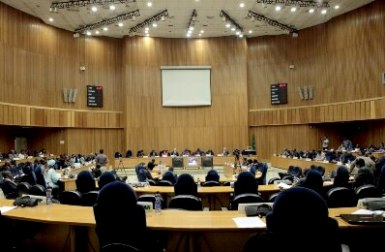African Union calls for security talks ahead of Sudan dialogue
September 15, 2014 (ADDIS ABABA) – The Peace and Security Council of the African Union (AUPSC) has finally opted for separate, but synchronised discussions on security measures between the warring Sudanese parties before they can engage in the internal dialogue process.

The government and rebel groups, however, diverged on how to proceed and where this political process was to be conducted.
While the government says the rebels should come and directly discuss ceasefire and security arrangements before joining the negotiating table with other stakeholders, the latter has demanded a humanitarian cessation of hostilities followed by separate negotiations abroad on the security arrangements and matters related to the war areas after which discussions on the new constitution can begin.
The AUPSC, in a resolution released on 15 September, following its 456 meeting acknowledged that the AU High Level Implementation Panel (AUHIP) and its chairman Thabo Mbeki will play the midwifery role of the national dialogue by brokering the security talks as well as an all parties conference in Addis Ababa to agree on a framework agreement for the political process.
“The negotiations on cessation of hostilities, immediately leading to a comprehensive security arrangements agreement, should resume at the earliest opportunity, under the auspices of the AUHIP and in collaboration and coordination with the JSR/JCM ‘Mohamed Ibn Chambas),” partly reads the AUPSC resolution.
“The negotiations on the cessation of hostilities for the Two Areas and for Darfur should be conducted in a synchronized manner,” it further added.
A rebel group, Sudan Liberation Movement – Abdel Wahid al-Nur (SLM-AW) warned last week that they would not accept a humanitarian cessation of hostilities, but requested that security measures be implemented to protect civilians in the war affected zones.
The Council, however, took in consideration a demand by the rebel and opposition parties on the need for a preparatory meeting to fix the rules of the national dialogue and agree on how to implement its outcome.
“A meeting of the Sudanese parties to discuss relevant process issues, in order to pave the way for the National Dialogue should be held at the AU Headquarters under the facilitation of the AUHIP,” decided the AUPSC.
The regional peace and security body emphasised the need to establish a conducive environment for the national dialogue and urged the Khartoum government to implement confidence-building measures.
Among these measures, the 15-member council mentions the release of all political detainees and prisoners, enacting the necessary legislations to ensure political freedoms and the freedom of expression and publication, and ensuring that the judiciary will be the only institution to adjudicate such matters.
But before any engagement in the internal process and in line with the AUPSC decision, the government has been requested to provide the “necessary guarantees for the armed groups freely to participate in the national dialogue, once the comprehensive ceasefire and security arrangements agreements have been concluded”.
Khartoum also has to facilitate humanitarian assistance to all populations in war-affected areas.
SUDAN’S DEBT & SANCTIONS
The African body called on the international community to provide “economic support package to Sudan, including expediting debt relief and extending concessionary loans”.
It also appealed to the United States and the European Union to lift the economic sanctions imposed on Sudan “ in order to contribute positively towards the creation of enabling conditions for the success of the national dialogue”.
Some EU countries consider the lift of economic sanctions imposed on Sudan and debt relief as they follow closely the ongoing efforts to hold the political process and to ensure effective implementation of its outcome.
On 9 August, the American acting chargé d’affaires David Kaeupur met with Sudanese presidential assistant Ibrahim Ghandour to hand over a message from US special envoy Donald Booth on the national dialogue.
Booth, in his message, expressed his government’s support to the internal process and encouraged Khartoum to create the necessary conditions for a genuine, holistic and inclusive dialogue.
(ST)
